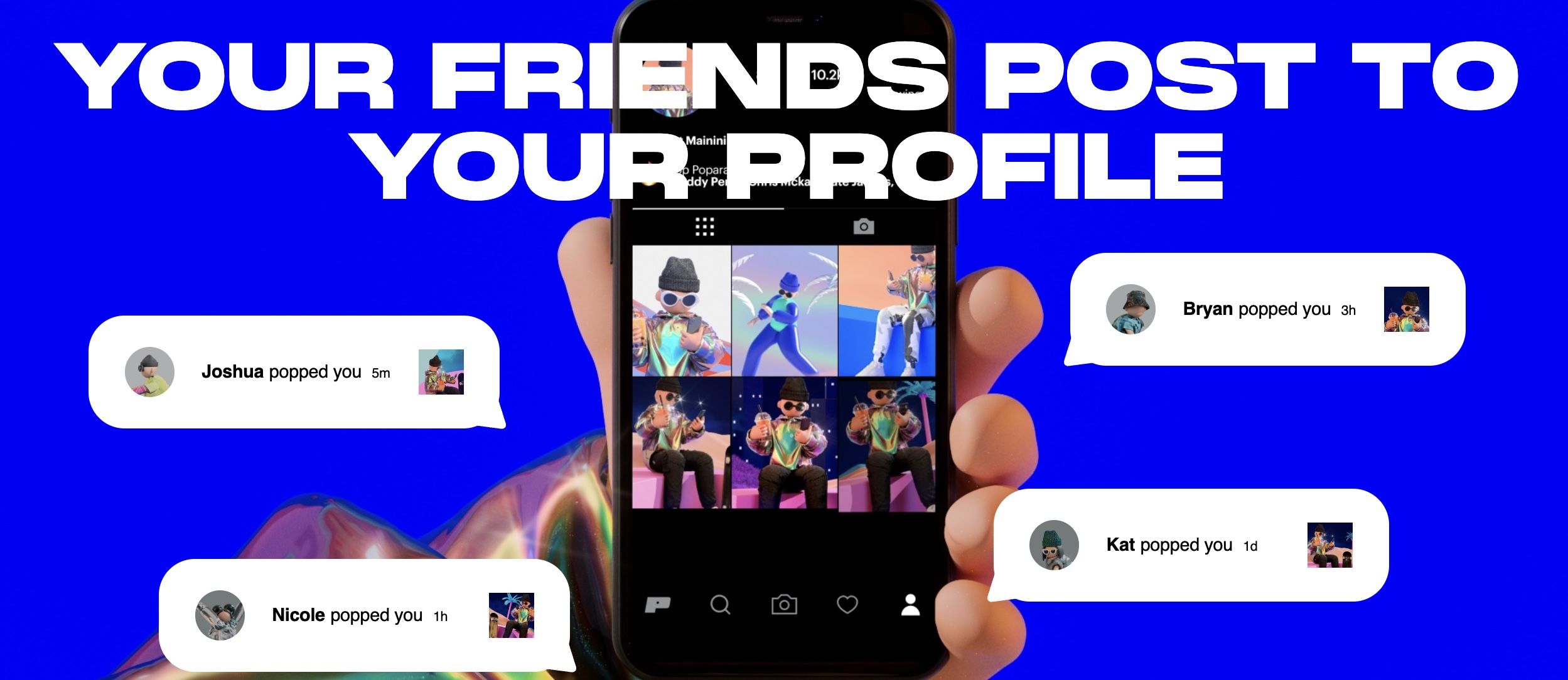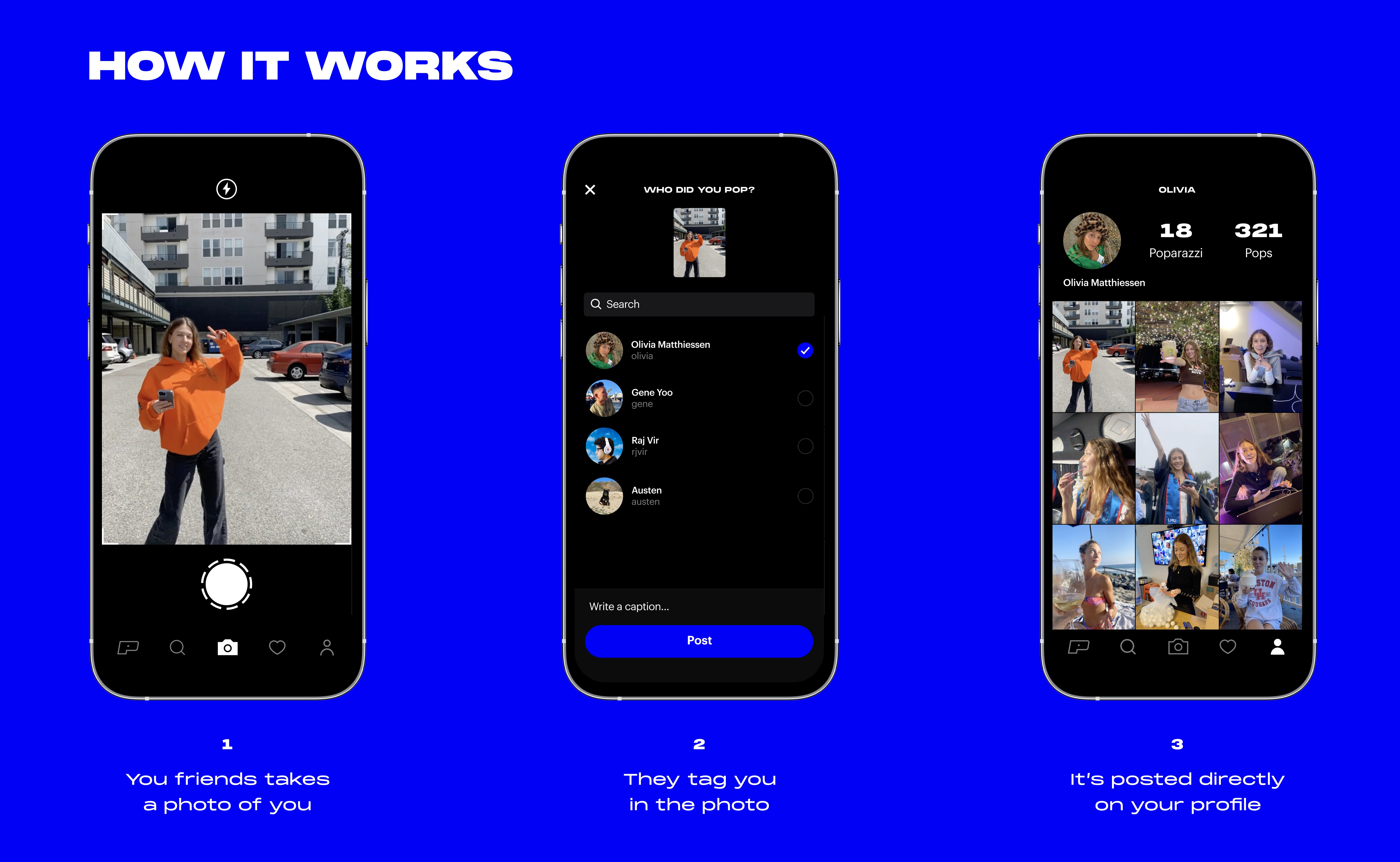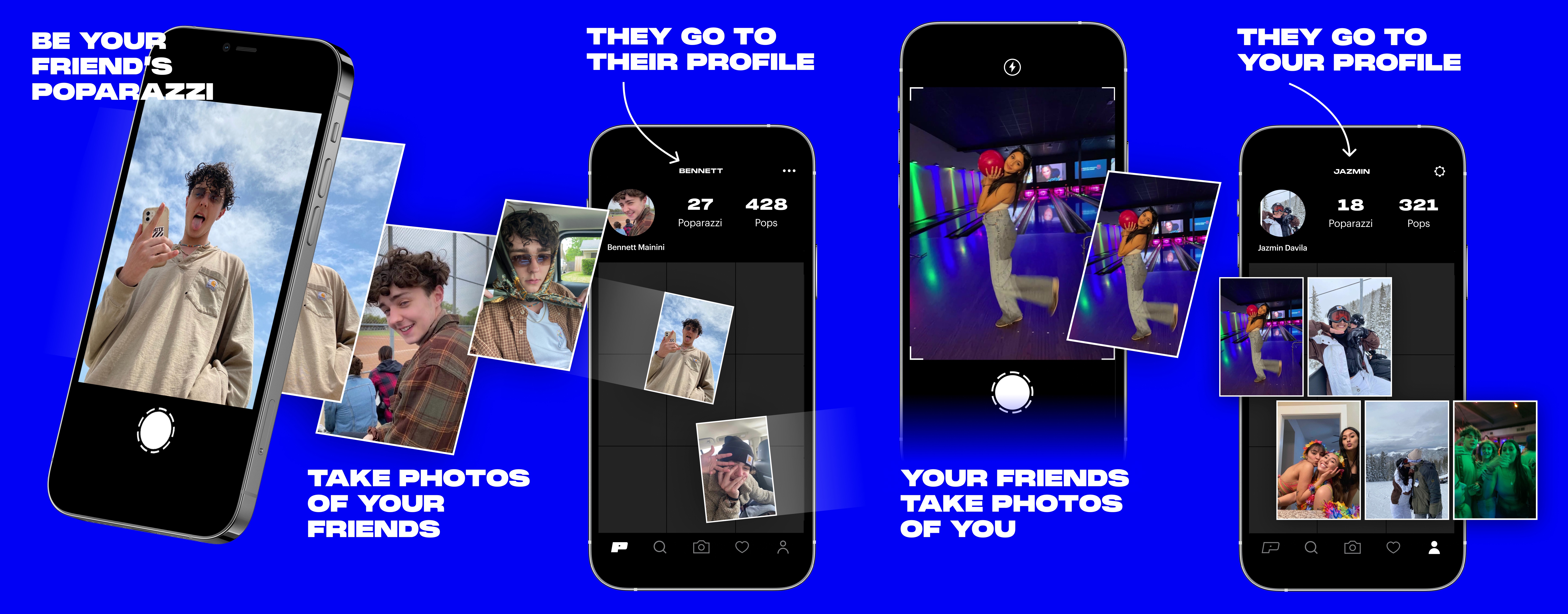Poparazzi, the anti-Instagram social app that hit the top of the App Store last year, is today, for the first time, detailing the growth stats for its business, its future plans and its previously unconfirmed Benchmark-led Series A round. The L.A.-area startup now reports its iOS-only has seen over 5 million installs in its first year, with users primarily in the Gen Z demographic.
The startup says that 75% of its users are between the ages of 14 and 18 and 95% of users are between 14 and 21. Most of its users are U.S. based, and to date, they’ve shared over 100 million photos and videos on the app.
While the startup positioned itself as an Instagram alternative where friends create your profile, the app’s competition today is not really the established tech giants. Instead, it’s the newer set of “alternative” social media apps that are targeting a younger crowd, like Yubo, Locket, LiveIn, HalloApp, BeReal and others. In general, this group of apps shares a thesis around how big tech is no longer the best place to connect with your real-life friends. With differentiated angles, they all claim to offer that opportunity.
Some of these are already outpacing Poparazzi. Yubo says it’s seen 60 million sign-ups to date. BeReal, which has declined press, has an estimated 12.3 million global downloads, according to app intelligence firm Sensor Tower. The firm also reports that Locket has seen about 18.7 million worldwide installs to date, while LiveIn has hit a little more than 8 million installs. (Sensor Tower also sees 4.6 million downloads for Poparazzi, which is largely in line with the startup’s claims, as these estimates aren’t an exact science.)
This heated competition among alternative social apps could explain why Poparazzi is taking to its blog today to share its metrics and confirm its financing after a year of silence. (Or it could be that it’s hiring.)

Though Poparazzi appears to be an overnight viral sensation, it’s actually taken 3 years to get to this point, explains co-founder and CEO Alex Ma. He, along with his brother, co-founder Austen Ma, went through several pivots to get to Poparazzi, he told TechCrunch.
“Poparazzi was maybe the 11th or 12th app that we built,” Alex says. Among those was the audio social network TTYL, a sort of “Clubhouse for friends.” But, says Alex, 9 months into TTYL the team realized that things weren’t working and they made the decision to wind it down.
The co-founders understood that most social apps fail and had decided the best thing to do was to keep building and experimenting until one hit. At other points, they tested a live texting app called Typo and many other social experiences. But when they built Poparazzi, they knew from day one it was something special. The app blew up, primarily among high schoolers, who were testing the app via TestFlight.
The app’s idea was, effectively, to turn one of Instagram’s core features — photo tagging — into a stand-alone experience. But in its case, photo tagging wasn’t an afterthought; it was the full focus.

On Poparazzi, users can create social profiles for photo-sharing purposes, but only your friends are allowed to post photos to them. That makes your friends your own “paparazzi,” of sorts — which is how the app got its name.
“It started off almost like a novel, dumb idea — like, what if you could build Instagram but didn’t let people post photos of themselves?” Alex says. “But the more we thought about it, the more we realized we were actually fundamentally changing the engine of what drives social today. And that was the big bet.”
To its credit, Poparazzi perfectly executed a series of growth hacks to generate buzz for its app that drove downloads at launch. The app launched on May 24, 2021, and quickly shot to the No. 1 position on the App Store.
Like many apps now, it smartly leveraged the TikTok hype cycle to drive App Store preorders. This helped to ensure the app would hit the Top Charts as soon as it became publicly available, given how the App Store ranks apps based on a combination of downloads and velocity, among other factors. Poparazzi also implemented a clever onboarding screen that used haptics to buzz and vibrate your phone as its intro video played — something that helped generate word-of-mouth growth as users took to Twitter to post about the unique experience.
But the app also bypassed some best practices around user privacy by requesting full access to users’ address books to get started. This allowed it to instantly match users to their friends based on stored phone numbers and quickly build a social graph.
However, it overlooked the fact that many people, particularly women, store the phone numbers of abusers, stalkers and exes in their phone’s contacts, so they can use the phone’s built-in tools to block the person’s calls and texts. Because Poparazzi automatically matched people by phone number, abusers could gain immediate access to the user profiles of the people they were trying to harass or hurt.
Alex says Poparazzi has since taken steps to address this, but explains the thinking around the original decision.
“It’s really hard to compete with Facebook, Snapchat and Instagram for the social graph,” he says. “So the starting point for building a social app typically is the address book because that’s the place where we can get information.” Plus, he adds, “I think the value of the app is close to zero without that initial friend graph.”

The app also rolled out other new features over the past year, including the ability to block and report users, and it’s invested in machine learning–powered content moderation for detecting things like nudity or hate speech. It’s added the ability to upload from the camera roll; provided support for video, messaging, comments and captions; and introduced in-app challenges that encourage participation — like “pop a friend eating ice cream,” “pop a friend at a mall,” or “pop a road trip.”
It’s now working to allow users to set their profiles to private and is planning an Android version. Longer term, it may monetize via events or merchandise, not ads — but this is still largely to be determined.
Prior to today’s update, the broad strokes of Poparazzi’s A round were already known.
In May 2021, Newcomer scooped the news that Benchmark partner Sarah Tavel had led Poparazzi’s “approximately $20 million” Series A, beating out Andreessen Horowitz for the deal. Alex says the round was actually a $15 million Series A, and confirmed Tavel joined its board.
This is on top of the company’s $2 million seed round closed in late 2018, before Poparazzi was developed. That round was led by Floodgate and included other investors like SV Angel, Shrug Capital and various angels. (Disclosure: unbeknownst to us until now, former TechCrunch co-editor Alexia Bonatsos was among them.) Floodgate’s Ann Miura-Ko joined the board with that fundraiser.
The funding gives Poparazzi, now a team of 15, a runway of over 2 years, Alex says.
And although some of the competition may be ahead of it for now, the startup believes in its potential largely because its premise is unique. Unlike every other social app on the market, it’s not for performative social media.
“We’re very different in the sense that it’s not about yourself,” Alex points out. “We’re putting the attention on the people you’re physically with, and the people that are in your life, rather than on yourself.”































Comment